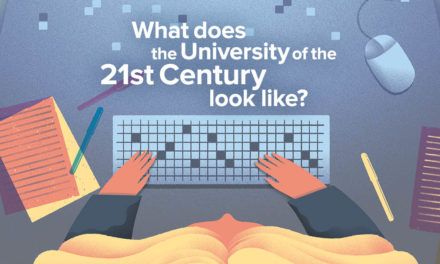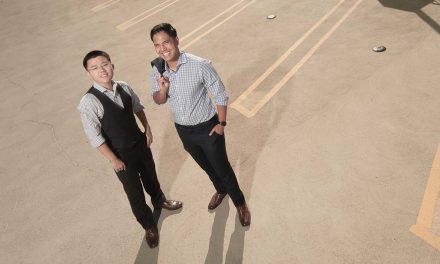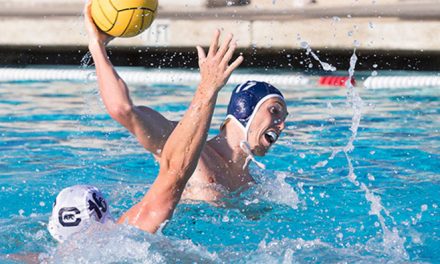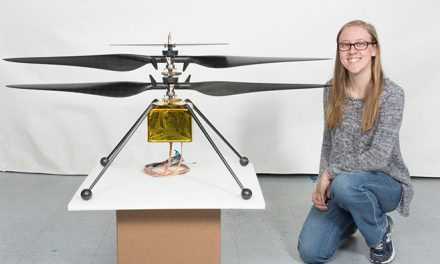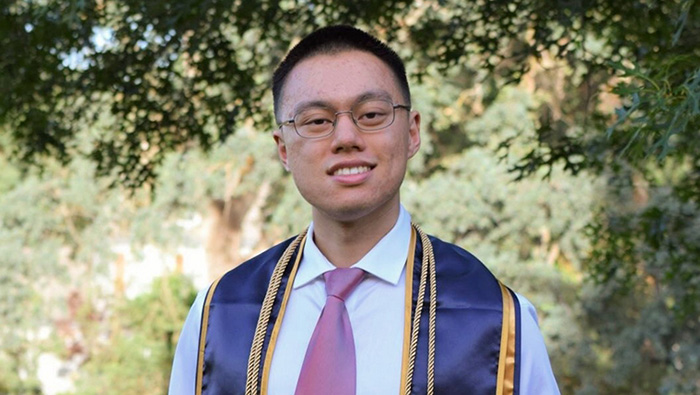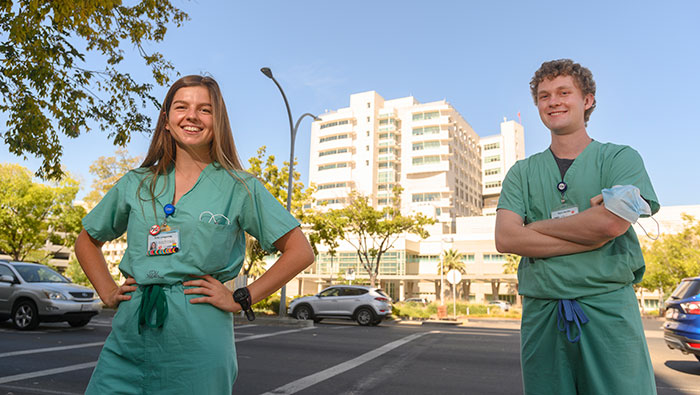
Julia Loegering ’19 and Kyle Jacobs ’19 work as researchers in UC Davis Health’s COVID-19 diagnostics lab. (Gregory Urquiaga)
Engineering Grads Aid COVID-19 Response
After graduation, Kyle Jacobs ’19 and Julia Loegering ’19 were looking for new ways to apply their engineering education as researchers in the lab of Nam Tran, associate clinical professor in the Department of Pathology and Laboratory Medicine at UC Davis. Little did they know, the opportunity would come sooner than they expected.
Shortly after the start of the pandemic, Tran became the lab director charged with overseeing all COVID-19 diagnostics at UC Davis Health. His lab was tasked with fully supporting UCDH in meeting community needs for COVID-19 testing.
Jacobs and Loegering functioned as support for drug studies on COVID-19 patients; collected samples for clinical teams validating antigen and antibody COVID-19 tests; supported studies that developed new diagnostic COVID-19 assays to address shortages; and provided further testing resources to the Sacramento community.
“One critical issue that became apparent early on was the shortage of viral transport media (VTM) and specimen collection swabs,” said Tran. “I was able to work with our Good Manufacturing Practice facility to make VTM. For swabs, we turned to the biomedical engineering department, and I assigned Kyle to be my point person from pathology.”
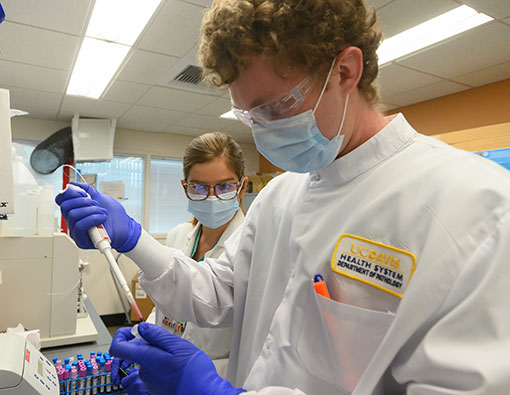
Jacobs and Loegering inside the Department of Pathology at UC Davis. (Gregory Urquiaga)
Jacobs’ goal was to co-lead a team that aimed to produce 3D-printed specimen collection swabs for COVID-19 testing at UC Davis in the event of supply chain issues.
The swab team included personnel from 10 departments: Department of Biomedical Engineering’s Translating Engineering Advances to Medicine (TEAM) lab, UCDH Office of Research, the School of Medicine Dean’s Office, Licensing and Accreditation, Environmental Health and Safety, Plant Operation and Maintenance, Central Sterile Processing, Infection Prevention, Purchasing/Distribution, and Hospital Leadership.
According to Loegering, the experience offered a quick lesson in interdisciplinary work.
“Accomplishing research in the clinical settings requires a lot of consideration and moving parts, which can be challenging when stepping into your first position after undergrad,” said Loegering. “There are many groups of people you interface with, including your own team, clinical staff, PIs, physicians, nurses, other research teams, regulatory bodies, patients and their families, and you want to meet everyone’s needs appropriately. To put it simply, being in a hospital setting for research redefines the word ‘dynamic.’”
While inevitable bumps in the road arose, Jacobs mentioned that he was very impressed by how the different groups came together to rapidly develop a workflow that could have provided continuity of COVID-19 testing for the community if the swab supply chain ran dry.
Fortunately, the swab supply chain stabilized, and the team never had to use the swab production facility. By the time the project was terminated, however, they had finalized a full workflow from 3D-printing and packaging to labeling and mass sterilization, distribution and use.
Both Jacobs and Loegering attributed much of their success on this project to their experience in their senior design course, for which they also worked with Tran.
“The curriculum provided me with a strong understanding of FDA regulation of medical devices and the requirements for each class of device. This translated well into the project since it provided me with a good idea of the requirements we needed to fulfill,” said Jacobs.
He added that the project management skills he gained in senior design were invaluable as they worked to meet tight deadlines and coordinate with the many groups involved with the project.
Loegering echoed that the senior design experience translated to the clinical environment. “Working on developing new COVID-19 rapid diagnostic tests required a beginning-to-end understanding of biomedical test development, which I first learned in my senior design courses at UC Davis. The medical device waterfall [development process] does not leave your life once you graduate, that’s for sure, and COVID-19 has accelerated testing and vaccine development to a senior design pace!”
This fall, Jacobs will continue his education through UC San Francisco’s Biomedical Sciences Ph.D. program. Loegering remains in Tran’s lab as they develop new COVID-19 testing methods.
Tran said the researchers performed with distinction. “The 3,000-odd samples that we have banked for clinical work are now being used to support research across the campus and industry,” he said. “These two BME graduates have made a very positive impact on UC Davis’ COVID-19 response.”

